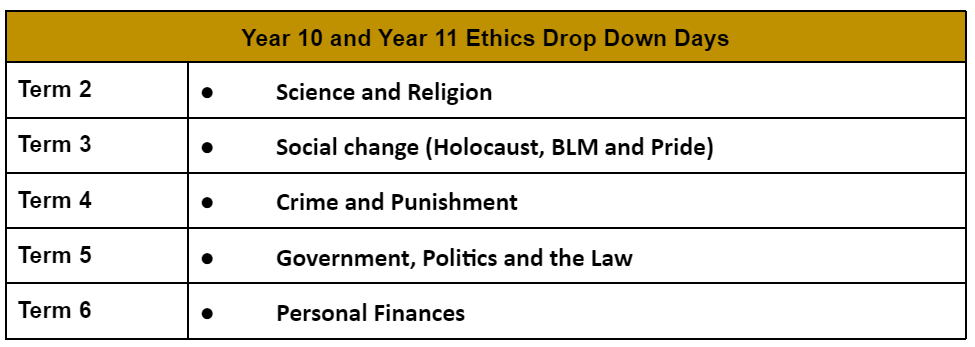
Ethics (RE and Citizenship)
In Key Stage 4 Ethics we cover the Citizenship National Curriculum, as well as the SACRE Kent Agreed Syllabus for Religious Education. All students will extend and deepen their knowledge and understanding of religions and world views (including non-religious world views), explaining local, national and global contexts. Building on their prior learning, they will appreciate and appraise the nature of different religions and world views in systematic ways.
They will use a wide range of concepts in the field of Religious Studies confidently and flexibly to:
-
contextualise and analyse the expressions of religions and world views they encounter.
-
They will be able to research and investigate the influence and impact of religions and world views on the values and lives of both individuals and groups, evaluating their impact on current affairs.
-
They will appreciate and appraise the beliefs and practices of different religions and world views with an increasing level of discernment based on interpretation, evaluation and analysis, developing and articulating well-reasoned positions.
-
They will be able to use different disciplines of religious study to analyse the nature of religion.
Specifically students will be taught to:
-
Investigate and analyse the beliefs and practices of religions and world views using a range of arguments and evidence to evaluate issues and draw balanced conclusions
-
Synthesise their own and others’ ideas and arguments about sources of wisdom and authority using coherent reasoning, making clear and appropriate references to their historical, cultural and social contexts
-
Develop coherent and well-informed analysis of diversity in the forms of expression and ways of life found in different religions and world views
-
Use independently, different disciplines and methods by which religions and world views are to analyse their influence on individuals and societies
-
Account for varied interpretations of commitment to religions and world views and for responses to profound questions about the expression of identity, diversity, meaning and value
-
Argue for and justify their own positions with regard to key questions about the nature of religion, providing a detailed evaluation of the perspectives of others
-
Enquire into and develop insightful evaluations of ultimate questions about the purposes and commitments of human life, especially as expressed in the arts, media and philosophy
-
Use a range of research methods to examine and critically evaluate varied perspectives and approaches to issues of community cohesion, respect for all and mutual understanding, locally, nationally and globally
-
Research and skilfully present a wide range of well-informed and reasonable arguments which engage profoundly with moral, religious and spiritual issues.
Additionally, teaching will build on the key stage 3 programme of study to deepen pupils’ understanding of democracy, government and the rights and responsibilities of citizens. Pupils will develop their skills to be able to use a range of research strategies, weigh up evidence, make persuasive arguments and substantiate their conclusions. They will experience and evaluate different ways that citizens can act together to solve problems and contribute to society.
Pupils will be taught about:
-
parliamentary democracy and the key elements of the constitution of the United Kingdom, including the power of government, the role of citizens and Parliament in holding those in power to account, and the different roles of the executive, legislature and judiciary and a free press
-
the different electoral systems used in and beyond the United Kingdom and actions citizens can take in democratic and electoral processes to influence decisions locally, nationally and beyond
-
othher systems and forms of government, both democratic and non-democratic, beyond the United Kingdom
-
local, regional and international governance and the United Kingdom’s relations with the rest of Europe, the Commonwealth, the United Nations and the wider world
-
human rights and international law
-
the legal system in the UK, different sources of law and how the law helps society deal with complex problems
-
diverse national, regional, religious and ethnic identities in the United Kingdom and the need for mutual respect and understanding
-
the different ways in which a citizen can contribute to the improvement of his or her community, to include the opportunity to participate actively in community volunteering, as well as other forms of responsible activity
-
income and expenditure, credit and debt, insurance, savings and pensions, financial products and services, and how public money is raised and spent.
Key Stage 4 - Ethics Overview

